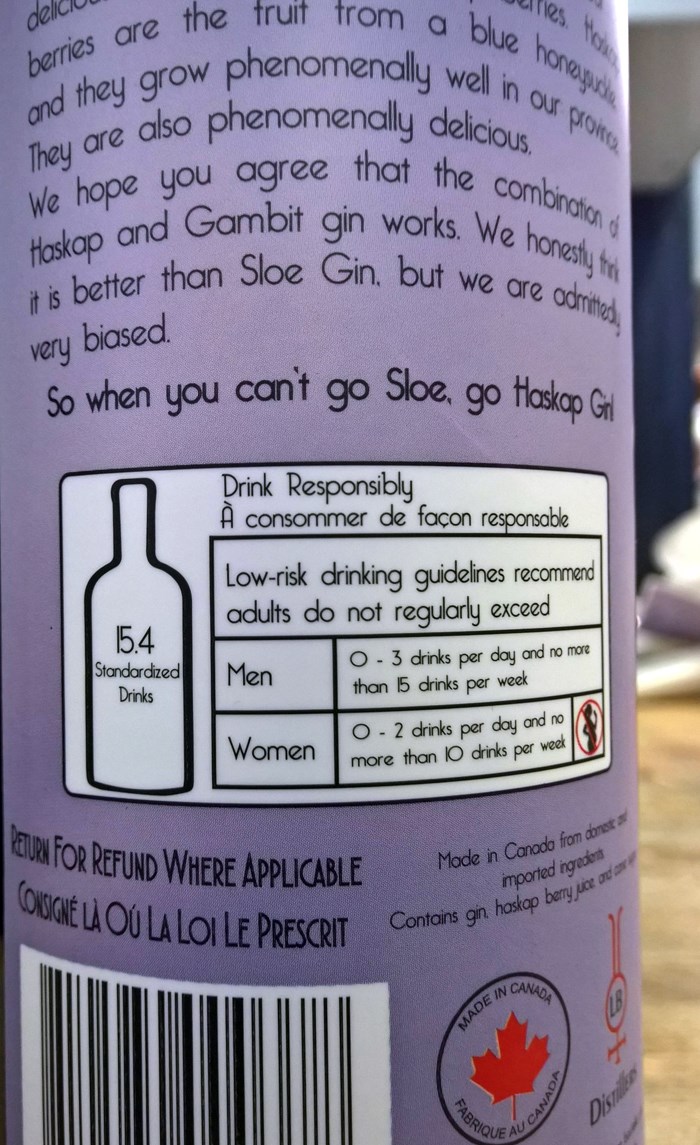Saskatoon’s Lucky Bastard Distillers has taken a bold and socially responsible step; a first for Saskatchewan and Canada. Information about Canada’s Low Risk Drinking Guidelines (LRDGs) is on the label of its new product, Haskap Gin. The information will be on all of LB Distillers products in the future. LB Distillers’ owner, Michael Goldney, stated, “We really do believe that we should promote responsible drinking. Putting ‘Please Enjoy Responsibly’ on every label is not clear for consumers. For most, this means not drinking and driving, and it is much more than that.”
The evidence-based LRDGs were developed by independent Canadian and international experts for the National Alcohol Strategy Advisory Committee, in collaboration with the Canadian Centre on Substance Abuse. The guidelines help Canadians make informed decisions about their drinking and encourage moderation. When people follow the LRDGs, they reduce their short (e.g. injury) and long term health risks (e.g., cancer).
LRDGs define standard drink sizes (5 oz. wine, 1.5 oz. hard liquor, and 12 oz. bottle of beer, cider or cooler). LRDGs also have recommendations for maximum amounts per week for safer drinking, including:
• Men: 0-3 drinks per day, up to 4 on special occasions, with no more than 15 drinks per week
• Women: 0-2 drinks per day, up to 3 on special occasions, and no more than 10 drinks per week
• Pregnancy and breastfeeding: 0 drinks
• Young people: delay alcohol use as long as possible, and if they choose to drink, do so at the lower spectrum of the LRDGs
Dr. Peter Butt from the University of Saskatchewan chaired the Expert Advisory Group that developed the LRDGs. “Lucky Bastard Distillers is demonstrating a progressive approach to Standard Drink labelling, and establishing a Canadian alcohol industry precedent,” says Dr. Butt. “People will be able to compare the number of standard drinks in a product to the National Low Risk Drinking Guidelines at the ‘point of pour’. This is good for consumers, and reflects genuine concern and appreciation by Lucky Bastard for their customers.”
The Saskatchewan Prevention Institute’s Fetal Alcohol Spectrum Disorder (FASD) Prevention Program Coordinator, Cara Zukewich states, “It is safest to plan a pregnancy and quit drinking before getting pregnant. This ensures the unborn baby is not exposed to alcohol. The LRDGs list pregnancy as a time for zero alcohol”. FASD is a permanent disability caused by prenatal alcohol exposure.
Rita Notarandrea, CEO, Canadian Centre on Substance Abuse and Co-Chair, National Alcohol Strategy Advisory Committee states, “We applaud the distiller for taking the important step of creating a drink label that informs consumers about Canada’s LRDGs and communicates the number of standard drinks in the bottle. Together, these two elements can help Canadians make more informed choices to help reduce their health risks. We encourage more alcohol manufacturers to provide consumer education on standard drinks and to add this information to their labels.”




